Nigeria’s federal government has approved the reopening of all schools across the country, six months after they were closed to curb the spread of Covid-19.
That’s according to several news articles and blog posts shared on Facebook on 2 October 2020.
“The Minister of Education, Adamu Adamu, made the announcement that schools should reopen during a press briefing in Abuja on Friday,” ThisDay newspaper reported.
“He said all unity schools should open by October 12 ‘while states and private schools will determine their own modalities of reopening’. Many states including Lagos, Oyo, Kano and Enugu, have since announced dates for the reopening of schools in their states.”
In June, Africa Check debunked a false claim that Nigerian schools would reopen. And Facebook’s fact-checking system has flagged these latest reports as possibly false.
Are schools across Nigeria set to reopen in October?

On 2 October Adamu briefed the media on the federal education ministry’s decision to reopen all schools.
“After due consultation with the presidential committee on Covid-19,we have decided that all our 104 unity colleges should reopen on the 12th of October, 2020,” he said. “States and private school owners will work out the modalities for the opening of schools under their purview.”
He urged school owners to “be vigilant, strict, and rigid in the implementation of Covid-19 protocols for the safety of our children and ourselves” once schools were again open.
The reports shared on Facebook are correct. – Motunrayo Joel
That’s according to several news articles and blog posts shared on Facebook on 2 October 2020.
“The Minister of Education, Adamu Adamu, made the announcement that schools should reopen during a press briefing in Abuja on Friday,” ThisDay newspaper reported.
“He said all unity schools should open by October 12 ‘while states and private schools will determine their own modalities of reopening’. Many states including Lagos, Oyo, Kano and Enugu, have since announced dates for the reopening of schools in their states.”
In June, Africa Check debunked a false claim that Nigerian schools would reopen. And Facebook’s fact-checking system has flagged these latest reports as possibly false.
Are schools across Nigeria set to reopen in October?

‘Be vigilant’
On 2 October Adamu briefed the media on the federal education ministry’s decision to reopen all schools.
“After due consultation with the presidential committee on Covid-19,we have decided that all our 104 unity colleges should reopen on the 12th of October, 2020,” he said. “States and private school owners will work out the modalities for the opening of schools under their purview.”
He urged school owners to “be vigilant, strict, and rigid in the implementation of Covid-19 protocols for the safety of our children and ourselves” once schools were again open.
The reports shared on Facebook are correct. – Motunrayo Joel
Republish our content for free
For publishers: what to do if your post is rated false
A fact-checker has rated your Facebook or Instagram post as “false”, “altered”, “partly false” or “missing context”. This could have serious consequences. What do you do?
Click on our guide for the steps you should follow.
Publishers guideAfrica Check teams up with Facebook
Africa Check is a partner in Meta's third-party fact-checking programme to help stop the spread of false information on social media.
The content we rate as “false” will be downgraded on Facebook and Instagram. This means fewer people will see it.
You can also help identify false information on Facebook. This guide explains how.





Add new comment